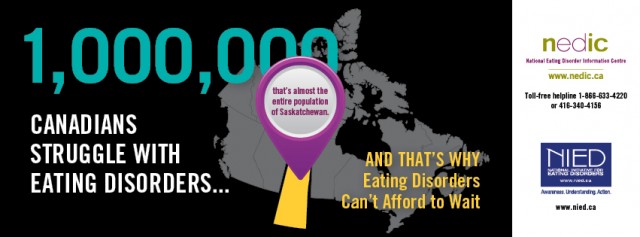Image retrieved from http://nedic.ca/edaw
Blog post written by Therese Kenny, MSc, PhD Student Clinical Child and Adolescent Psychology
Over the past week, I have felt the enormous support for Eating Disorder Awareness Week (EDAW). Landmarks across Canada have been lit up purple and my social media feed has been filled with posts opening up the conversation about eating disorders. People have courageously shared their stories to promote awareness and to spread the message that eating disorders cannot afford to wait.
Eating disorders affect millions of Canadians. NEDIC estimates that 1 in 2 Canadians know someone (including themselves) who has an eating disorder and that 1,000,000 individuals in the country meet diagnostic criteria for an eating disorder. That is nearly the population of Saskatchewan.
Eating disorders have devastating consequences. Eating disorders have the highest mortality rate of any psychiatric illness and are, sadly, often associated with suicide. Additionally, eating disorders have severe psychological effects and are often associated with other mental illnesses like anxiety, depression, and substance use disorder. Living with an eating disorder is all consuming, isolating, and exhausting. So even though the individual may be physically alive, it can still feel like a life is lost.
Eating disorders have physical consequences at any weight. Eating disorders are psychological illnesses with physical consequences. Many individuals mistakenly believe that physical effects, such as organ failure, only occur among individuals with anorexia at low body weights. This is not true. Eating disorders can have physical consequences at any weight. Moreover, individuals across the weight spectrum die from eating disorders.
So what can we do to ensure that eating disorders do not have to wait?
Donate. If you are able, you can make a financial donation to an organization like NEDIC, WWEDC, or Sheena’s Place to support eating disorder outreach and support. If you do not have the funds, you can donate your time to support an eating disorders organization in your area.
Talk. After EDAW is over, keep the conversation going. You can do so by sharing posts on social media periodically, talking to your family and friends, or writing blog posts. If you have lived experience, you only need to share as much as you are comfortable and it is possible to share information without disclosing! There are also lots of ways to anonymously post online if you want to spread awareness but are not ready to open up.
Participate. If you are interested in helping professionals learn more about eating disorders, participating in research is a great way to advance our understanding of eating disorders. This does not just apply to individuals with lived experience (although these perspectives are invaluable!). It is also important to understand differences between individuals with and without eating disorders. So even if you have never had an eating disorder, you can still be involved in helping researchers learn about eating disorders.
Although EDAW is over for another year, it is possible to keep the conversation going. With small steps like donating, talking, and participating, we can make it heard that eating disorders cannot afford to wait.
For more information, please visit http://nedic.ca/edaw


